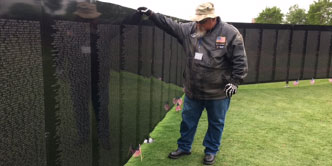ABOUT THIS PROJECT
As the years move us further and further away from the realities of the Vietnam War and recognition of those who served, we must find ways to keep alive the memories of the those who sacrificed for us, and honor those who returned home to an unwelcome nation. The release of Ken Burns' documentary provided a special opportunity to increase Hampton Roads’ audiences’ connections to this war through community engagement and dialogue.
Providing a platform for conversations requires a channel to elicit open dialogue and connect individuals to a shared experience. As art is a neutral convener that can connect individuals regardless of ethnicity, gender, orientation or age, WHRO will offer a glimpse into the lives and experiences of soldiers, friends and family through various art forms. Through live readings, an art display, and interactive digital content, audiences will have a greater connection to, compassion for, and understanding of events and realities of The Vietnam War.
To support this epic series, WHRO Public Media offered three preview screenings for our audience. Each screening included a special unique presentation. You can read about these amazing events below..
PAST EVENTS
SCREENING & PRESENTATION: The Telling Project
August 15, 2017
Through a partnership with The Telling Project, we were able to share live monologues of four individuals whose lives have been shaped by the war. Telling their stories were two Vietnam Veterans, one a former P.O.W., a South Vietnamese Air Force Veteran, and a first generation Vietnamese. Below is an excerpt from one of the stories.
“I spent 5 1/2 years in seven different POW camps, and they were all pretty much similar: no windows; hot in summer and cold in winter; a wood or concrete bed; light on all the time. We bathed in cold well water and used a rusty bucket for a toilet. I lived alone for the first six months. After that, I had various roommates. I spent most of time in my room.
5 years. We were told we were being released just days before by the last camp commander. We knew it was going to happen because they had divided the POWs by shoot down date and sent us to different camps. There was no show of emotion by the POWs. We were given some street clothing, put on buses and taken to the airport. There we were turned over one at a time to the USA officers and taken aboard the C141.
It was wonderful to board the C141 and leave North Vietnam. To finally arrive at Naval Air Station Miramar, San Diego, CA to see my wife and 4 children 6 years after I left on my last deployment. It was the highlight of coming home. March 13, 1973.”
The presentation was followed by a behind-the-scenes look at Ken Burns’ upcoming documentary, The Vietnam War.



Vietnam Graffiti Project
July 13 2017
They were messages that were carefully preserved for 30 years. Names, drawings, notes of love or humor—all left behind on the bunks of troop transport ships that carried servicemen as they headed off to the Vietnam War. We recently presented these canvasses filled with graffiti during an event at Norfolk’s Slover Library.
Art Beltrone, a military artifact historian, discovered the graffiti while consulting on historical items for a movie. He and his wife founded the Vietnam Graffiti Project to collect and preserve the historic canvasses and place them in museums throughout the country. A portion of the exhibit has traveled throughout the United States for the last 10 years.
During the presentation Beltrone shared stories behind some of the messages that included political drawings, musings on the 1960s, and thoughts on an uncertain future. His presentation was followed by a behind-the-scenes look at Ken Burns' upcoming documentary, The Vietnam War.


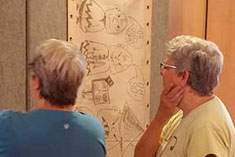
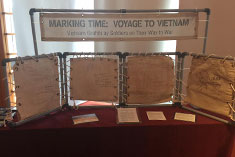
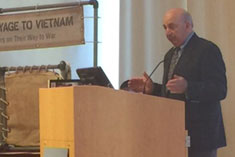
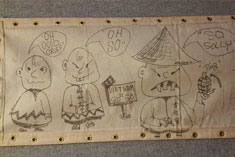
STORIES FROM THE WALL
June 15 2017
On June 15 we presented "Stories form the Wall" at the Williamsburg Public Library. The evening featured readings of remembrance of 18 Vietnam veterans from Virginia. WHRO recruited 13 community volunteers to present stories of these fallen soldiers: remembrances left online by friends and family for Virginians whose names are on The Vietnam Veteran Memorial Wall in Washington, D.C.
The community members who read these personal and often heartbreaking stories for the event's 122 attendees included seven veterans, three of whom served in the Vietnam War themselves. The presentation was followed by a preview screening and behind-the-scenes look at Ken Burns' 10-part documentary series, The Vietnam War.


RETREAT AT DONG HUNG TEMPLE
May 2017
As part The Vietnam War initiative, WHRO worked in partnership with the Dong Hung Temple in Virginia Beach to develop an event that brought together local Vietnam veterans with members of the Vietnamese community for a day of sharing. Led by Buddhist monk, Thich Chuc Thanh, attendees participated in a time of meditation, shared a meal, enjoyed a tea ceremony, contributed to a guided discussion, and ended their time together with a burning ceremony. It was an opportunity to let go of any past hurts or bitterness and explore ways the war affected themselves and others.
“I Sit Here” – A Poem from the Retreat
Thich Chuc Thanh, a Buddhist monk who serves at the Dong Hung Temple in Virginia Beach, wrote a poem and dedicated it to local Vietnam veterans as part of a retreat the temple hosted in early May. Local musician Narissa Bond crafted a song from the English translation of the poem and performed it at the event. Read the poem.
“I sit here listening to the inviting sounds of mother earth and sky”
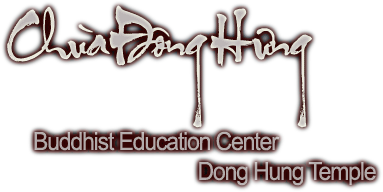
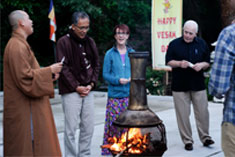
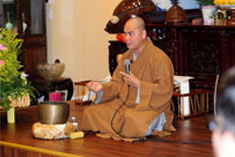
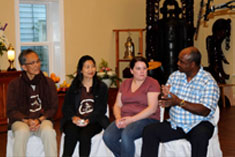
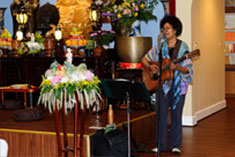
THE WALL THAT HEALS
April 20-23 2017
April 20th to the 23rd of this year, The Wall That Heals came to Norfolk. The Wall That Heals exhibition is a half-scale replica of the Vietnam Veterans Memorial in Washington, D.C. Approximately 250 feet in length, the replica is constructed of powder-coated aluminum, is made up of 24 individual panels and, like the original Memorial, is erected in a chevron-shape.
As on The Wall, the names on The Wall That Heals are listed by day of casualty. Beginning at the center/apex, the names start on the East Wall (right-hand side) working their way out to the end of that wing, picking up again at the far end of the West Wall (left-hand side) and working their way back in to the center/apex, joining the beginning and end of the conflict at the center.
To honor the soldiers whose stories are told in WHRO's Stories from the Wall, station staff visited The Wall That Heals and photographed every soldier's name.



